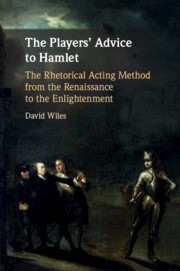 The Players' Advice to Hamlet
The Players' Advice to Hamlet Published online by Cambridge University Press: 16 January 2020
In this chapter I provide a sketch of rhetorical performance practice as it emerges from the rich, complex, and contradictory texts of the Greco-Roman world. A visual conception of ancient rhetoric: John Bulwer’s representation of rhetorical stage acting, which contrasts the stage actor with the dialectician. Greece and Rome: Greece developed the art of rhetoric, accepting the centrality of acting or ‘hypokrisis’, while Roman orators placed more emphasis on the constant persona of the orator. Cicero and Roscius: a case study of how Cicero used performance skills to defend the celebrity stage actor in court. Cicero’s ‘De Oratore’: Cicero’s masterpiece, couched as a dialogue to make it clear there is no single set of rules for being an orator. Quintilian: who codified Cicero, and made rhetoric the foundation of an educational programme. Tacitus: who dissented from Quintilian’s political conformism. Augustine: who tried to adapt his rhetorical training to serve the needs of Christian preaching, anticipating the dilemmas faced by rhetorical performers in the Renaissance.
To save this book to your Kindle, first ensure no-reply@cambridge.org is added to your Approved Personal Document E-mail List under your Personal Document Settings on the Manage Your Content and Devices page of your Amazon account. Then enter the ‘name’ part of your Kindle email address below. Find out more about saving to your Kindle.
Note you can select to save to either the @free.kindle.com or @kindle.com variations. ‘@free.kindle.com’ emails are free but can only be saved to your device when it is connected to wi-fi. ‘@kindle.com’ emails can be delivered even when you are not connected to wi-fi, but note that service fees apply.
Find out more about the Kindle Personal Document Service.
To save content items to your account, please confirm that you agree to abide by our usage policies. If this is the first time you use this feature, you will be asked to authorise Cambridge Core to connect with your account. Find out more about saving content to Dropbox.
To save content items to your account, please confirm that you agree to abide by our usage policies. If this is the first time you use this feature, you will be asked to authorise Cambridge Core to connect with your account. Find out more about saving content to Google Drive.